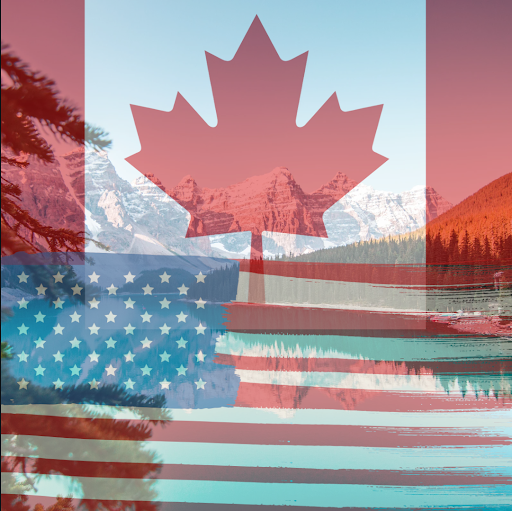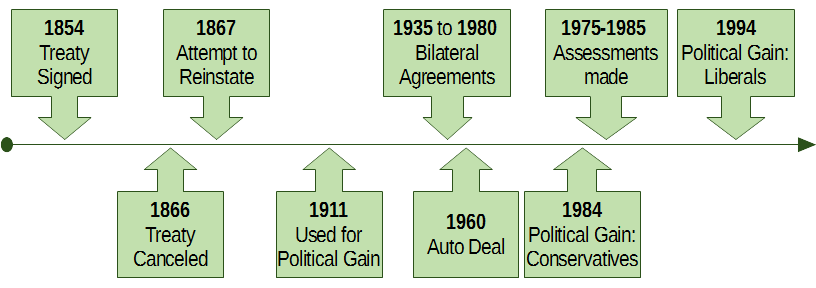Canadian History With New Eyes: The Dark Ages?
The Dark Ages & the French Wars of Religion Some time ago, I started to
Home / Canada-US Trade Treaties… History Repeating Itself Since 1834

This article was first published in June 2018.
In June 2018, the news that had been eclipsing Canadian and US News feeds, and social media was the latest fallout over the Free Trade Agreement between Canada and the US. Trump vs. Trudeau
On July 1st, 2018, on Canada’s 151st Birthday, Canada implemented tariffs on a number of American products in the ongoing trade war with the US.
While researching one of the Christian Fathers of Confederation, I came across some information about the fractious nature of this issue even before the advent of Confederation. So this is what I found:
In 1852, Sir Adams George Archibald, one of our Christian Fathers of Confederation, was 38 years old. He was a Member of the Legislative Assembly in Nova Scotia and had been advocating for a reciprocity agreement with the United States to increase trade. That reciprocity agreement was negotiated between the US and the then-British Colonies of New Brunswick, PEI, Ontario, and Quebec.
Nova Scotia was inadvertently excluded from the agreement. This angered the then-Premier Joseph Howe to the point that he rejected the agreement.
Friends, some manner of ‘Free Trade’ agreements between Canada and the US began while Canada was still a British colony in 1854.
In 1866, 1 year before the Canadian Confederation, the US Congress voted to cancel the Reciprocity Agreement. When Sir John A. MacDonald became Prime Minister in July of 1867, he tried and failed to have it reinstated. Many Canadian politicians became more ‘protectionist’. Many expressed fear that closer ties with the US would lead to annexation.
Could it be that the issue of annexation was high on the minds of Canadians because, in March of that year, negotiations were in process between the US Secretary of State, William Henry Seward, and the Russian minister to the U.S., Eduard de Stoeckl, to purchase Alaska? It has been suggested that the Russians did not want to risk losing Alaska in a battle with its then-rival – Great Britain and Alaska eventually became the 49th state of the US on January 3, 1959.
The concern expressed in both Canada and Britain was that the US would try to acquire Rupert’s Land also. Britain immediately started negotiations for Rupert’s Land to become part of Canada. The prevailing American sentiment, at that time, was to oust Britain from North America. At that time, Rupert’s Land (largely a fur trading entity) encompassed parts of Ontario, Quebec, Manitoba, Saskatchewan, Alberta, and the Northwest Territories.
You can read about the sale of Alaska and the subsequent purchase of Rupert’s Land, here.
In the 1911 election, the ruling Liberal Party was very supportive of Free Trade. The issue was just as divisive then, with prominent Conservatives campaigning on anti-American sentiments. The Liberals lost the election. Since then, for 40 years (1935-1980), the US and Canada agreed to many bilateral trade agreements. Both benefited from reduced tariffs. The most important agreement was for the Auto industry in 1960. After that 1960 agreement, the Canadian government wanted to pursue free trade in other sectors of the economy, but the US was not interested. In fact, they wanted to phase out some aspects of the guarantees in the auto deal.
Some Canadians resurrected the age-old fears about the loss of sovereignty and loss of jobs to the South. The concept of free trade was studied exhaustively between 1975 and 1985 by various Canadian Senate Standing Committees. The last of these committees suggested that Canadians should exercise a “leap of faith” in the pursuit of more trade with the US.
Just before the election of 1984, debates in the House of Commons on implementing yet another trade agreement, were very fractious. The Liberals and NDP bitterly opposed it on the grounds of protecting Canadian Sovereignty, employing anti-American ads that expressed fears that Canada would become the 51st State. They also expressed concerns about the impact on Canada’s social programs and the long-standing auto agreement.
That election was dubbed “the Free Trade Election” and was won by Brian Mulroney of the Conservative Party, even though polls indicated that the majority of Canadians were against it.
There was not as much opposition to it in the US, where polls indicated that up to 40% of Americans were blissfully unaware that the agreement had been signed. It passed through the Congress with little resistance. Analyses of the Free Trade Agreement show that often the deciding factor that brought benefit to either Canada or the US was the rise or fall in the value of each other’s currency. Each side has benefited from the other’s currency woes.
From 1990 to 1991, Canadians benefited from a high dollar trading against the US dollar. From mthe id to late 1990’s, when the Canadian dollar fell against the US dollar, Americans benefited more, so much so that Canada was dubbed ‘Hollywood North’. It had become cheaper to make movies in Toronto than in Hollywood.
In 1993, Jean Chretien, as leader of the Liberal Party was elected as Prime Minister on the promise to renegotiate NAFTA. He delivered on his promise when he and Bill Clinton created separate deals to address the labour and environmental aspects of the agreement.

1854 (a reciprocity treaty was signed with the British North American Colonies)
1866 (treaty cancelled)
1867 (an attempt was made to reinstate the treaty by Sir John A but it failed)
1911 (Reciprocity Agreement was used as political fodder in the elections which the
Conservatives won)
1935 to 1980 (bilateral agreements)
1960 (auto deal)
1975-1985 (assessments were made by various Senate Committees)
1984 (Trade with the US was again used as election fodder in favour of a Conservatives win)
1994 (Trade with the US was again used as election fodder in favour of the Liberals)
In 2018, the trade wars continued full steam ahead. This time, because of technological advances in farming methods, a more rapid means of transportation of goods to many countries, and almost instant intercontinental communication, the world has become more connected than before. Measures and counter-measures taken in the trade wars have become more public and instant. The trade war has now expanded between Canada and the US and between the US and other countries like China, the EU, and Mexico. They have all weighed in on what they see as unfair US trade restrictions and policies against them. These allies on this issue, have strategized to impose retaliatory tariffs against the US, days apart from each other.
This issue was front and centre of election platforms in 2019, and it is also important in the provincial election of 2025. This information is not hidden. One click of your mouse can result in oodles of information in the information-saturated culture in which we live.
So what have I learned from all this? From 1852 to 2025, VERY LITTLE has changed concerning a tenuous, fractious relationship on trade between Canada and the US… one that is based on fear and suspicion. Even with technological advances, better tools of communication, access to information on the internet, and a highly educated set of civil governors, VERY LITTLE has changed.
WHAT has stayed the same? Man’s deceitful heart. Rulers have obfuscated, manipulated, deceived, and rode to power on the goodwill of the people they are supposed to serve.
We need leaders like Solomon who prayed for a heart of wisdom in 1 Kings 3:3-9.
First: Pray. Better yet, pray and fast… that God will raise up men of regenerate hearts who will lead both countries with the fear of God and not the fear of man.
Second: Study history. Listen to our podcasts. Read our Articles. Follow us on Facebook. Keep informed. If you don’t know your history you are doomed to make the same mistakes of the past.
Third: Encourage your sons and daughters to be children of Issachar (1 Chronicles 12:32) and to study HOW God’s Law can still be applied to ALL of life, especially in civil government.
Fourth: Become politically savvy by reading information and supporting organizations like ARPA (https://arpacanada.ca/) and the CHP (https://www.chp.ca/) which are explicitly Christian and profess the desire to both raise up Christian leaders and rule with righteousness.
Fifth: Share this information on your social media feed. Educate the public.
Remember, “Righteousness exalts a nation but sin (obfuscation, manipulation, deceit) is a reproach to any people.” Prov. 14:34.
Author’s Note: Lynette is the owner of ChristianRoots Canada. Blogger. Publisher. Course Creator. Passionate about Canadian History from the perspective of God’s Providence.
The Dark Ages & the French Wars of Religion Some time ago, I started to
In many places, like legislatures and schools, the Bible is considered ‘hate literature’. Counseling someone
Dominion Day had been a federal holiday that celebrated the enactment of The British North American Act which united four of Britain’s colonies – Nova Scotia, New Brunswick, Upper and Lower Canada (which became Ontario and Quebec), into a single country within the British Empire, and named that country The Dominion of Canada.
Britain’s claim of Rupert’s Land by the Doctrine of Discovery, proved to be one of